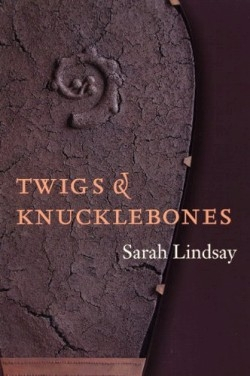Twigs and Knucklebones
In her latest collection of poems, Twigs and Knucklebones, Sarah Lindsay revels in the pleasure of being omniscient. Writer and reader alike enjoy the privilege of superhuman knowledge in poems that blur the line between the apocryphal and the real world. A spider crawls out from the ash in “Elegy from Quagga” as if to say, “Not yet”; however damaged, the world remains.
Nowhere is this trope of continuation more on display than in the centerpiece of the book, a series of poems about the fictional kingdom of Nab. In reverse chronological order, Lindsay explores the eras of Nab—late, middle, late middle, early middle, and early—via the archeologists who pry into the remnants and the Nab people who left them there. As the archeologists try to fill in the infinite blanks left by broken bowls, pillars, and a couple of red beads, Lindsay gives us the missing stories. The parallel between poet and archeologist is a satisfying one, highlighting the shared tools of fact and imagination. Indeed in “Destruction,” the fictional archeologist Baron van Hausknecht is described as an artist, “melancholy, solitary, / in love with beauty in all its forms.” This all-embracing approach easily describes Lindsay’s poems, which are impressive in their attention to detail. Each event, however small, is given weight and understood in the larger context of humanity. In “Flukes,” one example of a fluke is “the tail of a whale—especially a white one, / cleaving the sea with a sound to our puny ears / like a cataclysm, world derailed.”
Despite frequent derailings, the world continues, and these poems that highlight decomposition are also poems that suggest something akin to hope.
Lindsay made a splashy debut with her first collection of poems, Primate Behavior, a finalist for the National Book Awards. Twigs and Knucklebones is her third collection, and the title comes from a description of van Hausknecht: “his well-fleshed memory withered reluctantly / to a few twigs and knucklebones.” The decay of this vibrant character is appropriate for these poems that toe the line between life and death. In order for the historical cycle to continue, there must be loss. One Nab woman who has buried her infant son asks with affecting insight, “Where does it come from, this stubborn idea / that we should decide what we keep?” It is one of the few questions left unanswered by Twigs and Knucklebones.
Reviewed by
Erica Wright
Disclosure: This article is not an endorsement, but a review. The publisher of this book provided free copies of the book to have their book reviewed by a professional reviewer. No fee was paid by the publisher for this review. Foreword Reviews only recommends books that we love. Foreword Magazine, Inc. is disclosing this in accordance with the Federal Trade Commission’s 16 CFR, Part 255.

